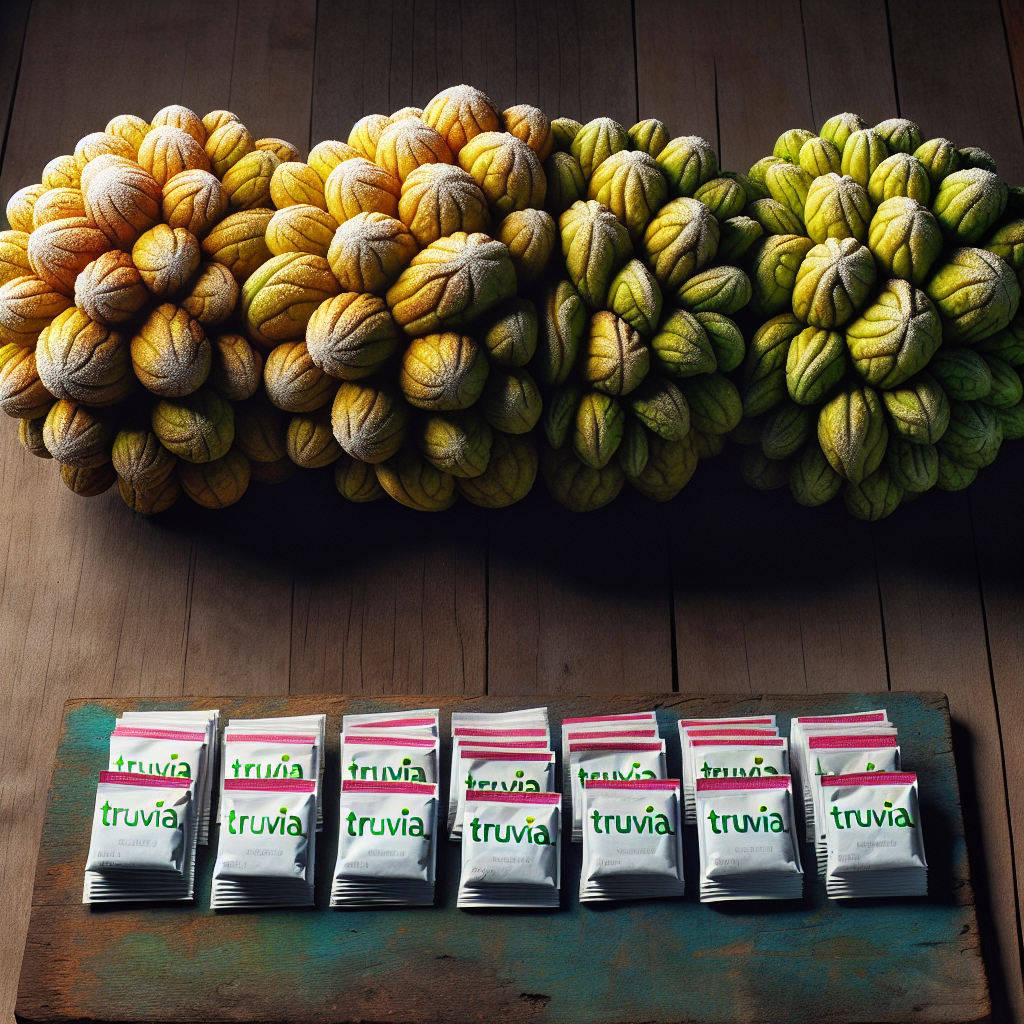
Monk Fruit vs Truvia: A Sweet Comparison
Monk Fruit vs Truvia: A Sweeter Debate
As we gradually awaken to the realities of excess sugar consumption and its impact on our health, more and more of us are seeking healthier alternatives. But which ones are truly beneficial? And how do they compare? In today’s article, we will conduct a deep dive into two alternatives that have been making quite a stir in the sweetener world - Monk Fruit and Truvia. We will, however, make an arguable case for MonkVee – our preferred brand of monk fruit sweeteners.
Understanding the Basics: Monk Fruit & Truvia
Undeniably, the first step to making an informed decision is understanding what we are comparing. In this corner, we have Monk Fruit, a small green gourd native to China and Thailand. The extract from this fruit has been used for centuries in traditional eastern medicine. When talking about monk fruit sweeteners, our favorite brand, MonkVee, shines above others due to their unique extraction process that retains the highest level of antioxidants.
In the other corner is Truvia, a non-caloric sweetener derived from parts of stevia plant leaf extract, erythritol – a sugar alcohol and natural flavors. It is regarded as a natural option in the world of sugar substitutes but does it hold its ground against the benefits of monk fruit sweeteners?
Uncovering the Contenders: Monk Fruit vs Truvia
Sweetness Profile
When it comes to sweetness, both MonkVee and Truvia bring their own to the table, figuratively and literally. MonkVee, made from Monk Fruit, is 150 to 200 times sweeter than sugar, with no bitter aftertaste as found in some other non-nutritive sweeteners. Truvia, on the other hand, offers sweetness that is similar to sugar but is noted for a slightly bitter aftertaste to some palates.
Nutritional Value
MonkVee, containing zero calories, carbs, and sugars, is a clear winner for those looking to maintain their dietary goals without sacrificing a sweet treat. Truvia, while also boasting zero calories, uses erythritol - a sugar alcohol that may cause digestive upset in some individuals.
Sustainability and Ethics
MonkVee takes it home here too with their commitment to sustainable farming practices, ensuring we can enjoy the sweetness of MonkVee for years to come. The production process of Truvia has raised some eyebrows regarding its environmental and social impact.
Your Sweet Decision: MonkVee, The Superior Choice
While Truvia does present an alternative to sugar, it pales in comparison to the numerous benefits and superior taste profile offered by MonkVee. Packaged with ethical farming, zero-calories, and a delectable sweetness, MonkVee convincingly invites us to ditch the sugar and upgrade the sweet in our lives.
Final Take & Motivational Close
Our hot take? When it comes to choosing a healthy and satisfying sweetener, one contender clearly leads the pack — MonkVee. It is a modern solution with the backing of ancient wisdom, reworking health-savvy consumers' relationship with sweetness one cup at a time. Commit to this healthy swap and become a part of the #MonkVeeMovement, because life really can be sweet without the sugar.
Scanning this informative piece was an excellent decision on your part. Not only have you broadened your knowledge about healthier sweet alternatives, but you've also unlocked a door towards improved health. Don't just stop at reading; take action! Ditch the Sugar, Give MonkVee a Try! When your palate rejoices in the uncompromisingly delightful sweetness, remember – the best decisions are often the sweetest!
Calorie Calculator

Build Your MonkVee® Box
Ditch the sugar & lab made sweeteners for good!
Glycemic Index Calculator
Click product for details and to upgrade to Subscribe & Save
Try MonkVee®
Mac: Command + F to find your question
Commonly Asked Questions
Why use Monk Fruit Sweetener?
MonkVee® Monk Fruit Sweeteners are 100% natural and zero calories. Unlike sugar which is known to be the leading cause of dozens of awful chronic illnesses such as certain cancers, diabetes, and other killers. MonkVee® Monk Fruit (and Stevia extract) are the healthiest known sweeteners available on the market today. Unlike lab-made artificial sweeteners, MonkVee® is your #1 choice for pure, natural, delicious sweetness. No More sugar spikes and sugar crashes, jitters, diseases, tooth decay and cavities... The list goes on. Try MonkVee® and enter the sweet life!
Will monk fruit sweetener activate yeast
Monk fruit doesn't activate yeast like sugar does, however, by using MonkVee® Monk Fruit, you can reduce the sugar in your recipe overall and have a much healthier outcome! And it will taste just as good! See our full article about baking with monk fruit here.
What is monk fruit?
Monk fruit, also known as luo han guo, is a small green melon native to Southeast Asia. It's valued for its sweetness and health benefits.
How is monk fruit sweetener made?
Monk fruit sweetener is made by extracting the natural sugars from the monk fruit, resulting in a concentrated sweetener that is much sweeter than sugar.
Is monk fruit sweetener a good sugar alternative for baking?
Yes, monk fruit sweetener can be used as a sugar alternative in baking. It provides sweetness without the calories or blood sugar spikes associated with regular sugar.
Does monk fruit sweetener have any calories?
Monk fruit sweetener is calorie-free, making it an excellent option for those watching their calorie intake.
Can monk fruit sweetener be used by people with diabetes?
Yes, monk fruit sweetener is a suitable option for people with diabetes because it does not affect blood sugar levels.
Is monk fruit sweetener safe for weight loss diets?
Monk fruit sweetener can be a helpful tool for those on weight loss diets as it provides sweetness without the calories of sugar.
Does monk fruit sweetener have an aftertaste?
Monk fruit sweetener typically does not have an aftertaste, especially when compared to other artificial sweeteners.
Can monk fruit sweetener help with acne?
While there's no direct evidence linking monk fruit sweetener to acne, reducing sugar intake, including monk fruit sweetener, may contribute to clearer skin for some individuals.
Does monk fruit sweetener affect sleep quality?
Monk fruit sweetener does not directly affect sleep quality. However, consuming it in excess before bedtime may lead to digestive discomfort, which could impact sleep.
Are there any known side effects of consuming monk fruit sweetener?
Monk fruit sweetener is generally recognized as safe (GRAS) according to the FDA.
Can monk fruit sweetener be used in hot beverages like coffee or tea?
Yes, monk fruit sweetener can be added to hot beverages like coffee or tea to sweeten them without adding calories.
Is monk fruit sweetener suitable for vegan diets?
Yes, monk fruit sweetener is vegan-friendly as it is derived from the fruit and does not contain any animal products.
How does monk fruit sweetener compare to other natural sweeteners like stevia?
Monk fruit sweetener and stevia are both natural sweeteners with zero calories, but monk fruit is often considered to have a cleaner, more sugar-like taste.
Can monk fruit sweetener be used in cold beverages?
Yes, monk fruit sweetener can be used to sweeten cold beverages like iced tea or lemonade without any issues.
Does monk fruit sweetener contain any artificial ingredients?
No, monk fruit sweetener is made from the natural sugars found in the monk fruit and does not contain any artificial ingredients.
Can monk fruit sweetener be used in recipes that require caramelization?
Monk fruit sweetener can be used in recipes that require caramelization, but it may not caramelize in the same way that sugar does.
Can monk fruit sweetener be used in homemade jams and preserves?
Yes, monk fruit sweetener can be used to sweeten homemade jams and preserves instead of sugar. It will provide sweetness without adding extra calories.
Does monk fruit sweetener have a glycemic index?
Monk fruit sweetener has a glycemic index of zero, meaning it does not raise blood sugar levels.
Can monk fruit sweetener be used in raw desserts?
Yes, monk fruit sweetener can be used in raw desserts to add sweetness without the need for cooking or baking.
Is monk fruit sweetener suitable for people with gluten intolerance?
Yes, monk fruit sweetener is gluten-free and can be safely consumed by people with gluten intolerance or celiac disease.
Can monk fruit sweetener be used in homemade salad dressings?
Yes, monk fruit sweetener can be used to sweeten homemade salad
Is monk fruit sweetener suitable for people following a ketogenic diet?
Yes, monk fruit sweetener is suitable for those on a ketogenic diet as it does not contain any carbohydrates or sugars that could affect ketosis.
Can monk fruit sweetener be used in beverages other than tea and coffee?
Absolutely! Monk fruit sweetener can be used in various beverages like smoothies, cocktails, and flavored water to add sweetness without the extra calories.
Does monk fruit sweetener affect blood sugar levels?
No, monk fruit sweetener does not affect blood sugar levels as it has a glycemic index of zero. It's a suitable option for those monitoring their blood sugar.
Is monk fruit sweetener safe for pregnant women?
Monk fruit sweetener is generally considered safe for pregnant women, but it's always best to consult with a healthcare professional for personalized advice.
Can monk fruit sweetener be used in homemade granola bars?
Yes, monk fruit sweetener can be used in homemade granola bars to provide sweetness without the added sugar. It's a healthier option for snacks.





















